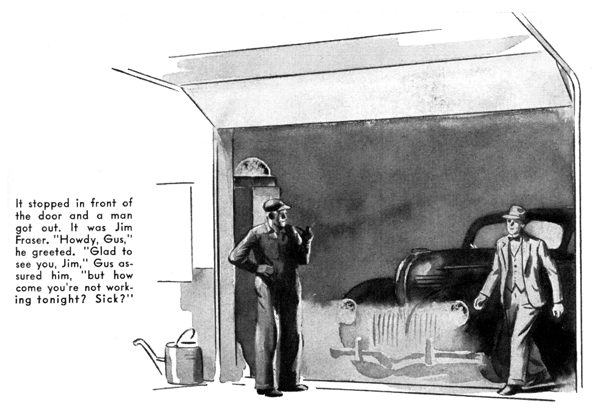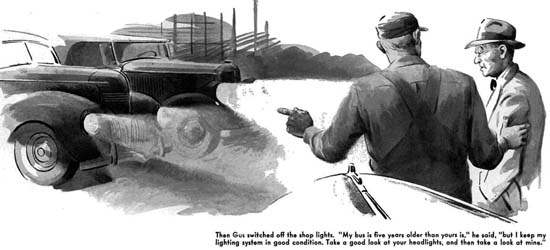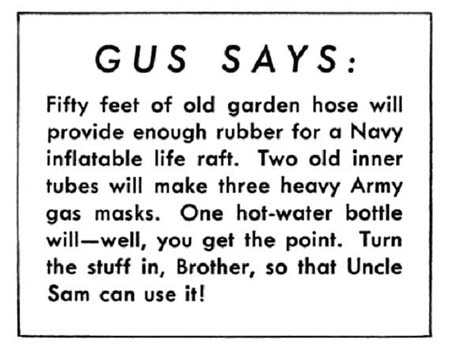October 1943
GUS BRIGHTENS 'EM UP
by
Martin Bunn
The Model Garage proprietor knows his cars and customers
well enough to tell in a flash which one - car or customer -
needs some careful doctoring

It was a warm evening. Along about nine o'clock Gus Wilson, who was working what in prewar days he would have called over-time but now considers normal hours, lighted his pipe and stepped to the open shop door to breathe in a few lungfuls of fresh air.
After he had been standing there for five minutes he saw a car turn off the highway and come up the Model Garage drive. It stopped in front of the shop door and a man got out. It was Jim Fraser, a small red-haired, middle-aged man who used to clerk in Henry Miller's hardware store but who now works nights in charge of the stockroom of a war plant five or six miles from our town.
"Howdy, Gus," he greeted. "Saw your lights burning, and thought I'd stop in for a few minutes."
"Glad to see you, Jim," Gus said. "But how come you're not working tonight? Sick?"
"Eyes have gone bad," Fraser said. "I can't see like I used to. ‘Specially when I'm driving at night. I'm going to see an eye doctor tonight -- only time we could get together -- and get myself fixed up with specs. I hate like the dickens to wear them."
'Huh," Gus said. There wasn't any sympathy in his voice because he was remembering something that he had noticed as Fraser had driven up the driveway. "Do you have any trouble seeing at night when you're not driving?" he asked.
"No -- now you mention it," Fraser admitted. "But my eyes sure are bad when I'm on the road after dark, and if I don't get specs I'll be wrecking my old bus some night."
"Got 15 minutes to spare?" Gus asked.
"Sure," Fraser told him. "I didn't know what time the eye doctor would get through with me, so I phoned the plant that maybe I wouldn't get there before eleven or twelve. Why?"
"Drive your car into the shop," Gus said, "and I'll show you something. It isn't your eyes that have gone bad. It's your car's lighting system."
"There's nothing the matter with my lighting system -- not a thing!" Fraser said almost huffily. "Of course, it ain't as good as these sealed-beam headlights the new cars have, but I can't afford to buy a new car,"
"You can't afford to be driving a car when you can't see where you're going, either," Gus told him. "Even if you're willing to risk your own neck, you haven't got any right to risk other people's. You don't need a new car any more than you need spectacles. What you do need is to have enough work done on your lighting circuit to make it as good as it was when your car was new. Drive her into the shop, Jim, so I can get a better look at her headlights."
Fraser drove his car into the shop. "Switch your lights on the high beam," Gus told him. He did it, and then got out and went around to where Gus was standing in front of his car. "When you came up the driveway from the road," Gus said, "I noticed how dim your headlamps were. There are a half dozen things that cut down the efficiency of a car's lighting system, and I miss my guess if every one of them isn't the matter with yours!
"To start off with, one lens is cracked so it lets in moisture and dirt that tarnish the reflector. I couldn't swear to it without opening the headlights, but I'd bet ten to one that your light bulbs are pretty close to being burned out. And I'd make another ten-to-one bet that you've got some bad connections in your lighting circuit. Now let me show you something."
He went over to his own ancient but immaculate roadster and turned on the lights. Then he switched off the shop lights. "My bus is five years older than yours is," he said, "but I keep my lighting system in good condition. Take a good look at your headlights and then take a good look at mine."
He waited long enough for Fraser to do his looking, and then switched on the shop lights. "It's up to you, Jim," he said then.
"Which do you think you'd better spend your money for -- a pair of spectacles that you don't need, or enough work on your lights to stop your being a public menace?"
"Have it your way," Fraser growled. "I'll bring my bus in on my way home from work tomorrow morning, if I can have it back by six o'clock in the evening."
"O.K.," Gus said. "And I'll guarantee that when you drive out of here tomorrow night you'll think you've grown a new pair of eyes."
When Gus got down to the shop next morning he found Wally, the grease monkey he is trying hard to turn into a mechanic, staring lazily at Fraser's '39 sedan. "What's the matter with this one, boss?" he asked between yawns.
"Lights," Gus said briefly.
Ten minutes later Wally came over to his bench. "Say, Boss," he reported, "I can't find anything the matter with those headlights except that one lens is cracked."
"You can't?" Gus asked. "How about the bulbs? Nothing wrong with 'em?"
"They turn on all right," Wally declared. "I tried 'em."
"I know they burn," Gus told him. "Bring 'em over here, will you?"
Five minutes later Wally came back with the bulbs. "Here they are," he said. "I had a heck of a job getting the headlights open."
Gus grinned. He glanced at the bulbs, and then took a sheet of white paper out of his workbench drawer and placed them on it.
"See how black they are? Bulbs blacken as they grow older, and the blacker they get the less light they put out. These are done for -- put new ones in."
"O.K.," Wally said. "What else'll I do -- put in a new lens?"
"Yes, but let me take a look before you do it," Gus said and went over to Fraser's car with him. He examined both the headlamp lenses closely, and then both the reflectors. "See anything wrong here, Wally?" he asked.
"Sure," Wally said. "Both the reflectors have lost their shine, one worse than the other."
"That's right, they have" Gus agreed. "But that isn't what I mean. What style lenses are these -- what's the name on them?"
Wally read the name molded in the glass: "RiteWay."
"Correct," Gus said. "Now, what name is stamped on the reflectors?"
Wally peered intently into the opened headlamps. "FlexBeams," he read after a few seconds.
"Right again," Gus told him. "But the combination isn't right.
To get the best results you've got to use lenses and reflectors of the same style, or the same trade name. Fraser must have had his lenses replaced some time, and didn't get the right ones for his reflectors. Put in new lenses, but make 'em FlexBeams."
"New reflectors, too?" Wally wanted to know.
Gus took the reflectors out of the headlamps and looked them over carefully. "No," he decided. "These reflectors aren't bent or dented -- they're just tarnished pretty badly. You often can remove tarnish by polishing them the right way. I'll show you how to do it."
Gus took the reflectors over to his workbench. From the shelf above it he took down a small can and a small bottle. "This is lampblack," he told Wally as he opened the can and poured some black stuff out into a clean saucer. "This is pure alcohol," he went on, uncorking the bottle. "You pour enough of it on the lampblack to make a thick paste -- so fashion."
He took a package of absorbent cotton from his workbench drawer and rubbed a small piece of it in the lampblack paste. "Watch now," he told Wally. "Polish this way -- lightly out from the center of the reflector. Never polish around the reflector. Go to it," Gus told him.
Twenty minutes later Wally, grinning triumphantly, held up the reflectors. "They're as good as new!" he announced.
"Well -- not quite," Gus qualified. "But they're good enough to do a decent job for quite a while. Be careful that you don't touch their bright surfaces while you're putting them back in the headlamps. Oh, another thing -- be sure to use new gaskets when you install the new lenses."
Toward the end of the afternoon, Gus got out his headlamp tester and checked the brightness of the lamps. "You did a good job, Wally," he told the grease monkey. "But they still aren't as bright as they should be. My guess is that there's voltage drop somewhere in the lighting circuit. That's always bad -- a 10 percent loss in voltage means a 30 percent loss candlepower. I'll have to do some checking."
Using a bulb-socket voltage adapter and a voltmeter, he found that there was more than a 10 percent drop in voltage between battery and lamp bulbs. Then he quickly looked over the wiring of the lighting circuit. "Thought so," he said. "Loose connections here. Poor ground contact here. And Lord know what other variations of grief will show up when we really get down to work on the job. Well, we can get around to all that in due time."
He went into the stockroom and came back with a relay which he installed in the upper-beam light circuit close to the headlamps, being careful to see that its base had a good electrical ground to the car frame. Then he installed a fuse holder and a 20 ampere fuse between the relay and the starting switch, and then used No. 12 gauge wire to make a lead from the battery terminal of the starting switch to the fuse holder and from the fuse holder to the relay.
"I don't get it at all," put in Wally.
Well, Gus explained, with the light switch closed for the upper beam, the relay closes a circuit direct from the battery to the headlamps. That takes the juice around the former lighting circuit, so the poor connections and other bad conditions in the circuit don't get a chance to cause a voltage drop. As a result, the lamp bulbs get the current they must have to operate at full efficiency. Get it now?"
"No," Wally said. "I don't."
"I'll explain it to you some other time," Gus said patiently. "Meanwhile we have to get these lamps refocused and aimed."
He moved the car onto the spot from which it was possible to adjust the lamps so that their beams would strike a wall marked to proper specifications of the right beam pattern. After he finished making the adjustments he looked up to see Jim Fraser standing there. "Well, I saw the eye doctor last night," Fraser said. "He sure gave me a going over. How's the car?"
Gus dispatched Wally for the brightness tester before replying, then turned to face his friend and customer.
"Wait two minutes, and I'll tell you," Gus said. Wally brought him the tester, and after he had put it on the lamps he grinned. Your headlights are as good as new," he told Fraser. "I mean that -- I've brightened 'em up so that they give the same road illumination that they gave the day you bought your car. Give them enough care to keep them that way, Jim -- it won't cost as much as buying specs would, and it'll keep you alive longer!"
"By golly!" Fraser exclaimed. "That's exactly what the eye doctor said."
END
L. Osbone 2019

